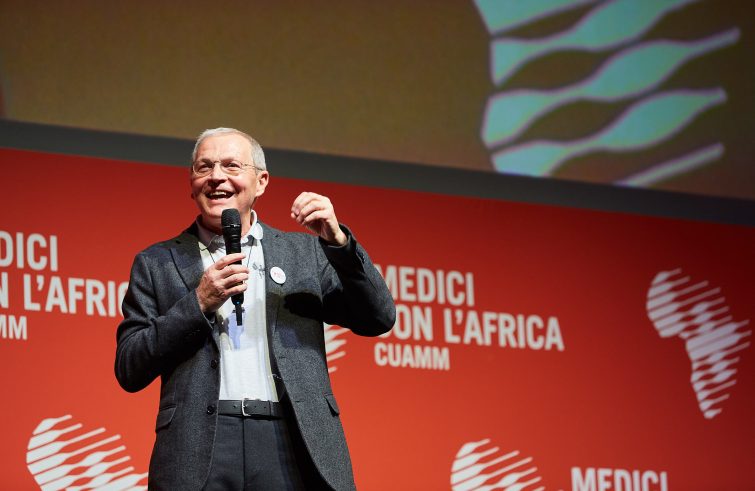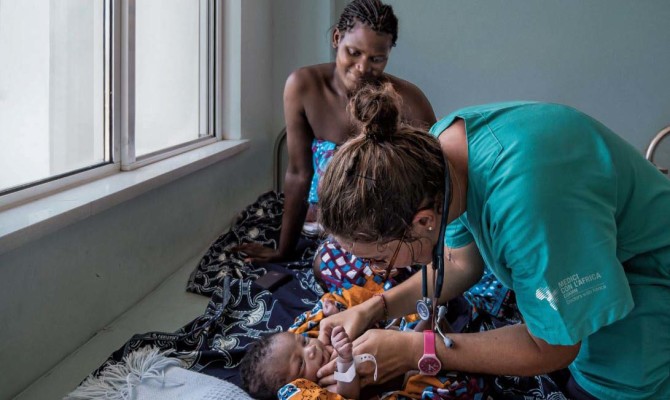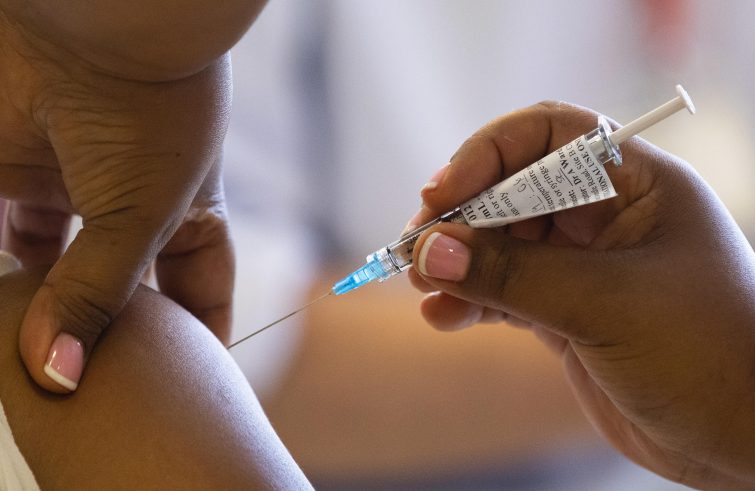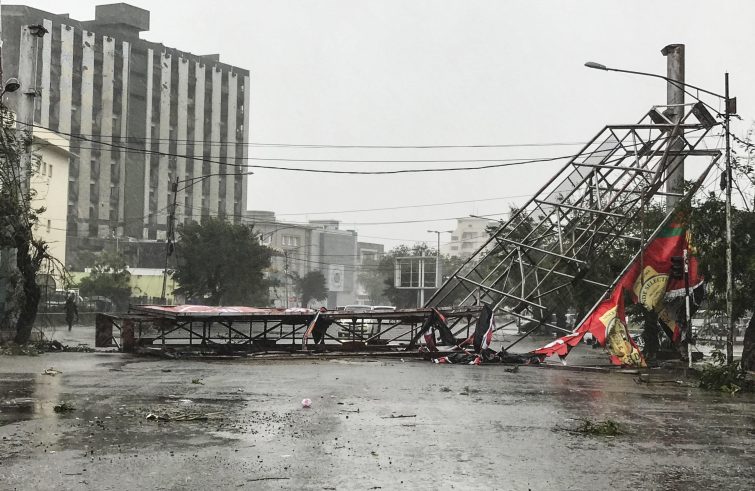
The goal has been reached and a new dream is in the process of becoming reality. Doctors with Africa CUAMM has successfully completed the “Mothers and Children First. 1,000 Days” programme, with 1,495,215 pre-birth consultations carried out; 331,178 assisted births; 10,837 severely malnourished children treated. It is now preparing to launch People and Skills: investing in continuous training has consistently been a priority for the organisation, whose mission is effectively improving the health of Africa’s population. The new programme, which involves 8 countries and 14 hospitals, sets a number of goals: 500,000 assisted births, the treatment of 16,000 malnourished children, the training of 1,500 health managers, 500 Italian and African postgraduates and 100 operational research projects. SIR interviewed Father Dante Carraro, Director of Doctors with Africa CUAMM.
Father Dante, the five-year “Mothers and Children First. 1,000 Days” project has been completed. Are you satisfied with the results?
We are. The target of the “Mothers and Children First” project was to attend 320,000 births in 10 hospitals in all eight countries in which CUAMM works. Despite the Covid pandemic, which caused a reduction in hospital admissions and halted transport, we achieved our goal of 331,178 assisted births, with an equal number of newborn babies being attended to, cared for and looked after. Behind every number there is a mother, a father and a baby.
We certainly know that we have not solved Africa’s problems, nor those of sub-Saharan Africa, but we have nevertheless given concrete support to mothers and children.
In addition to this, we pledged to treat 10,000 severely malnourished children, at risk of death due to severe malnutrition. Through our intervention, together with our African colleagues, we managed to save more than 10,000 children.
 Could you tell us about the new “People and Skills” programme?
Could you tell us about the new “People and Skills” programme?
The new challenge will again cover a five-year period involving the eight countries where we operate: Ethiopia, South Sudan, Central African Republic, Uganda, Tanzania, Angola, Mozambique and Sierra Leone. Fourteen hospitals will be involved in the initiative.
The first target is to provide assistance to 500,000 births with the same number of assisted and cared-for newborns.
It’s a big challenge, but we feel confident on the basis of our past experience. Furthermore, we are aiming to help 16,000 malnourished children.
We called the new programme “People and Skills” because the biggest asset we should focus on is human capital.
We decided to focus on three areas: education, clinical training for nurses and midwives, and health managers. Managerial skills, linked to performance, evaluation and management of financial, economic and human resources, are sorely needed.
Our commitment is to train 1,500 health managers over a five-year period. We also intend to promote the joint training of 500 Italian and African postgraduate students over the next five years,
with the opportunity to share clinical practice in hospitals, mentored by Italian and African doctors. Finally, research is a key aspect, as it is necessary to invest in studying the situation, understanding it and investigating it in depth, thereby enhancing expertise. We will thus also support the development of Africa’s healthcare capacity: 99% of the continent’s vaccines come from outside Africa. We intend to support African medical specialists, mostly young people, to join a collaborative network between African, Italian and European institutions. Hence,
the goal is to publish a total of 100 research papers in international journals in five years.
 You celebrated CUAMM’s 70th anniversary in Padua, a year late because of COVID: which challenges are you facing today in order to “restart”?
You celebrated CUAMM’s 70th anniversary in Padua, a year late because of COVID: which challenges are you facing today in order to “restart”?
The challenge ahead of us is to continue sustaining African healthcare systems where we are working. These health systems, which were precarious before the pandemic broke out, have deteriorated as a result.
Inequalities and weaknesses have increased. Many patients with chronic diseases, such as diabetes, tuberculosis or HIV, had no access to health services because of COVID-19. Mothers gave birth at home, with all the risks this entailed, and malnourished children could not be monitored. That is why, in addition to supporting health systems, including standard diseases, medicines, staff and infrastructure, the challenge today is the vaccination campaign.
The average vaccination coverage in Africa is 5%, with peaks of 40-45% in Morocco and less than 1% in South Sudan.
Vaccines are still in short supply. During the G20 summit, the international community, Europe, Italy and the most industrialised countries, pledged to deliver vaccines to poor countries in order to vaccinate 40% of the world’s population by the end of 2021 and 70% by mid-2022. These are highly ambitious targets, especially for the African continent. More doses are needed, avoiding vaccine hoarding by some countries and encouraging the manufacturing of vaccines also in Africa. In addition, it is important to ensure that the doses of vaccine that arrive in the capital cities actually translate into vaccinations. This requires efficient distribution, with trucks, pick-ups, scooters, bicycles and boats, to bring the vaccine to the very last mile of the health system. Obviously, the cold chain must be maintained, with refrigerators and storage units, as well as generators and fuel oil, syringes and gauzes. Healthcare workers, who hitherto only vaccinated children, need to be trained, and communities, even in rural and suburban areas, must be made aware of the importance of the vaccine. With regard to registry problems, village leaders should be properly informed to ensure that they monitor who has been given one or two doses.
 COP26 closed in Glasgow: to what extent is climate change affecting the environment and the health of people in the countries where CUAMM is working?
COP26 closed in Glasgow: to what extent is climate change affecting the environment and the health of people in the countries where CUAMM is working?
Strong action is needed to mitigate climate change, which is and will continue to be a heavy burden on the African continent: suffice it to mention the cyclones in Mozambique, famine and drought in South Sudan and southern Angola, and the heavy rains blocking transportation.
COP26 proposed certain changes, but they are not enough.
International players are undoubtedly essential, but we must also change our mentality, our heart, our approach to Creation. Pope Francis’ Laudato si’ impels us to adopt a more “Franciscan” approach, where nature becomes a sister, the sun a friend, the wind a travelling companion. Creation must be perceived as an inherent part of our lives.
Our appeal and that of so many organisations that, like us, work on the African continent, is to be more courageous. Climate change will have an increasingly severe impact, especially on the poorest people, and it risks devastating the most valuable gift we have: the wonderful place where we all live.









